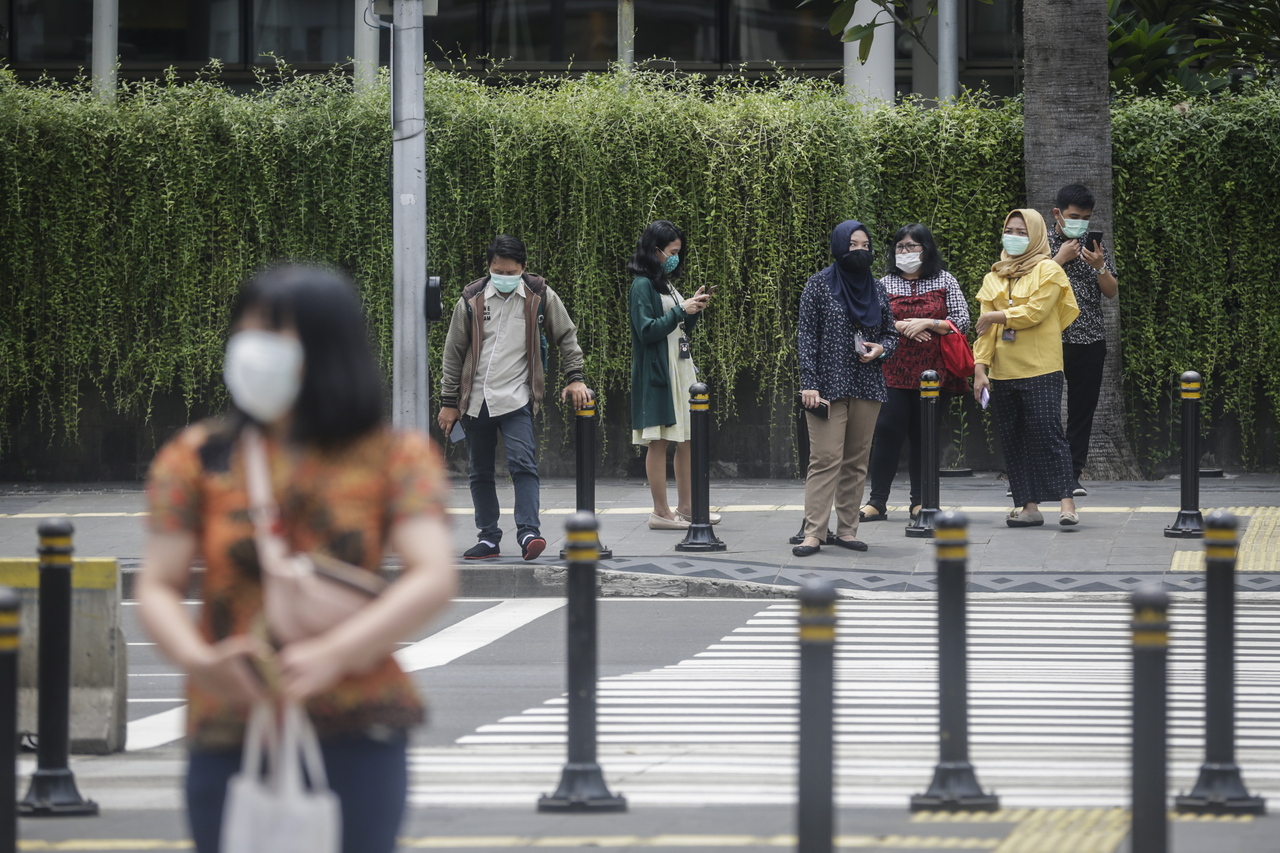Coronavirus: What state of emergency in Indonesian capital, provinces means
Sign up now: Get ST's newsletters delivered to your inbox

People with protective face masks waiting to cross a street in Jakarta on March 23, 2020.
PHOTO: EPA-EFE
Follow topic:
WHAT IS 'STATE OF EMERGENCY'?
With the coronavirus spreading rapidly across Indonesia, Jakarta Governor Anies Baswedan announced a two-week state of emergency in the capital city of 10 million from Mar 20 to April 2.
An emergency status allows the city's administration to deploy available resources including personnel and take mitigation measures by purchasing medical equipment and carrying out tests for Covid-19, the disease caused by the new coronavirus, by tapping the city's funds.
Besides Jakarta, at least six of 34 provinces across the country have declared a state of emergency.
They are: Yogyakarta, West Java, East Java, Banten, West Kalimantan, East Kalimantan.
WHAT HAPPENS DURING THE EMERGENCY?
While it is not a lockdown, the Jakarta administration is curbing the movement of people to and from the capital by shortening the operating hours of public transportation such as buses and intercity trains.
MRT Jakarta service hours have been cut by five hours, and now operates from 6am to 8pm.
Taxis and ride-hailing services, however, operate as usual.
From Monday (March 23), entertainment centres, including bars, massage parlours, spa centres, cinemas and billiard saloons, are shut.
Companies have been urged to close offices and allow their employees to work from home. Firms which are unable to shutter must reduce their activities and the employees working in the offices to key personnel.
However, there is no penalty for non-compliance.
Tourist sites such as the zoo and museums have been closed for two weeks since March 14. Schools were closed on Mar 16 for two weeks as well, and will reopen on March 30.
Shopping malls, supermarkets and wet markets will remain open.
Although some civil servants are allowed to work from home, government services are unaffected.
While there is no curfew, people are expected to reduce their activities and stay, study and worship at home.
Jakarta police have been called upon to disperse crowds at weddings and private parties.
WHAT ARE SOME OTHER MEASURES BEING TAKEN ?
Indonesia has restricted foreign arrivals from China, South Korea's Daegu city and Gyeongsangbuk province, Iran, as well as France, Germany, Italy, Spain, Switzerland, Vatican City and the United Kingdom.
The national government has bought 5,000 Avigan pills - an anti-influenza drug - and placed orders for two million more.
It is also preparing to secure three million chloroquine pills, typically used to treat malaria but which has been touted by some as a possible treatment for Covid-19.
Indonesia has taken delivery of about 150,000 testing kits from China, and plans to procure around 1 million more.
Exports of masks, protective personal equipment and antiseptics have been banned.
There are insufficient hospitals, healthcare workers and medical equipment to treat Covid-19 patients in the country.
The government will use the Athletes Village - a facility built for the 2018 Asian Games - and a former refugee camp on Galang island, in Riau Islands province, for Covid-19 patients.
Between 600,000 and 700,000 people are at risk of infection in Indonesia, and the outbreak is expected to peak in May, during the Muslim fasting month of Ramadan.

